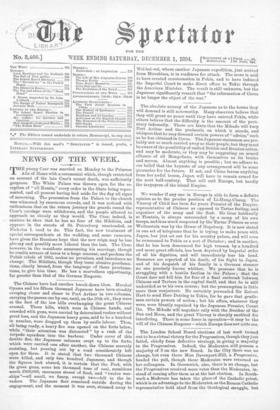We wonder if any one in Europe is able to
form a definite opinion as to the precise position of Li-Hung-Chang. The Viceroy of Chi-li has been for years Premier of the Empire, representative of Chinese as opposed to Tartar feeling, and organiser of the army and the fleet. He lives habitually at Tientsin, is always surrounded by a camp of his own troops, and is as ranch suspected by the Tartar Princes as ever Wallenstein was by the House of Hapsburg. It is now stated in one set of telegrams that he is trying to make peace with Japan, has just set out for his country palace, and will soon be summoned to Pekin as a sort of Dictator ; and in another, that he has been denounced for high treason by a hundred and more great officials, has been deprived by Imperial order of all his dignities, and will immediately lose his head. Rumours are reported of his death, of his flight to Japan, and of his despatch of his family in a German steamer no one precisely knows whither. We presume that he is struggling with a hostile faction in the Palace; that the Court dare not kill him for fear of a final outbreak between Chinese and Tartars in the capital itself, and that he is still undecided as to his own course ; but the presumption is little more than conjecture. He certainly persuaded Sir Robert Hart to send Herr Detring to Tokio, for he gave that gentle. man certain powers of action ; but his offers, whatever they were, were bluntly repulsed by the Japanese Premier, Count Ito. The Mikado will negotiate only with the Brother of the Sun and Moon, and the great Viceroy is sharply snubbed for interfering. There is some force in operation—it may be the will of the Chinese Emperor—which Europe does not quite see.


















































 Previous page
Previous page